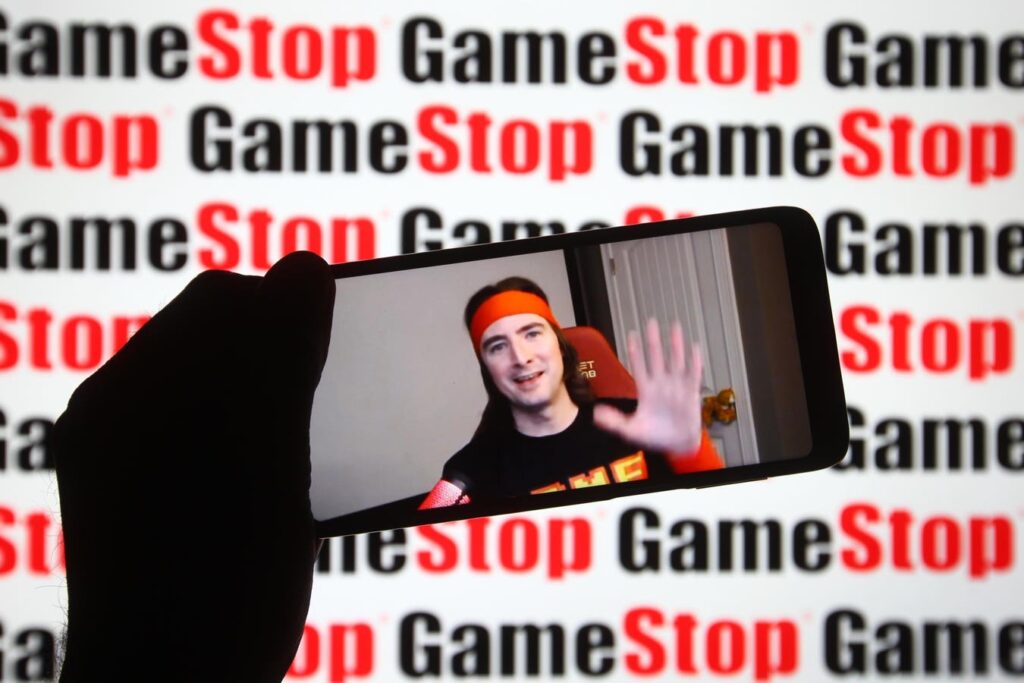Just because a stock pops after a meme stock hero posts on X, it does not mean you should sell the shares.
This comes to mind in considering Unity Software — the San Francisco-based video game software developer whose stock is up about 14% in Thursday morning trading.
The catalyst? A short clip posted on X by Roaring Kitty featuring “the late musician Rick James, who famously recorded a song titled ‘Unity,’ ” according to Investing.com. (Roaring Kitty is the alias of Keith Gill who four years ago famously turned a $50,000 investment in GameStop shares into $50 million, according to The Guardian.)
The meaning of Gill’s post is unclear. However, based on social media activity — which “quadrupled in recent hours,” noted Investing.com — investors view the post as bullish for Unity Software following a January 1 block trade of 1.32 million shares valued at $29.7 million,
While there are many risks to buying Unity Software stock — notably Gill’s post could have nothing to do with the software developer and some have speculated the post is bullish for GameStop, reported CNBC — CEO Matthew Bromberg, who took over last March, could presage an improvement in the company’s growth and profitability.
Here are three reasons Unity Software stock could rise:
- New, more game developer-friendly pricing policy.
- Global expansion through partnerships.
- Use of generative AI to boost developer productivity.
Since Bromberg discussed these topics on November 6, 2024, according to VentureBeat, the company’s stock — which fell 39% in 2024 — was roughly unchanged between his comments and the end of 2024.
Nevertheless, Bromberg sees a bright future for the company over the next five years. “We are really bullish on the long term value of Unity,” he told analysts in a November conference call featured by VentureBeat.
Unity says growth will come from helping developers make more money by providing them software to increase their efficiency and effectiveness. “We think we’re in a really unique spot, in a really big, vibrant business,” he added.
If Roaring Kitty knows something that convinces him Unity will grow much faster, perhaps the recent pop in its stock is only the beginning. Otherwise, investors should avoid the stock.
Unity Software Third-Quarter 2024 Performance And Prospects
In November, Unity Software reported mixed results for the third quarter, as revenue exceeded expectations but earnings fell below forecasts.
Here are the key numbers:
- Third quarter 2024 revenue: $446.52 million — down 18% from the year before and $18 million ahead of the consensus estimate, noted Investing.com.
- Q3 2024 adjusted loss per share: $0.31 — 17 cents worse than the analyst projection, Investing.com reported.
- Q4 2024 revenue forecast: $424.5 million at the midpoint of the range — which is $400,000 above the analyst estimate, according to Investing.com.
- 2024 revenue guidance: $1.7055 billion at the midpoint of the range — $605 million lower than analysts’ estimate, noted Investing.com.
“We focused on execution and discipline to drive more rapid product innovation and to restore the strong, authentic bond we have with our customers in our community,” Bromberg said in a November 2024 analyst call.
“We’ve acted on those intentions over the course of the last 90 days in many different ways, and we’re feeling we impacted that positive momentum, both inside and outside the company,” he added.
More Game-Developer Friendly Pricing Policy
Unity replaced its previous CEO John Riccitiello — who resigned in October 2023, according to Wired, with interim CEO James Whitehurst. In May 2024, Bromberg took over as Unity’s CEO.
One of the reasons for Riccitiello’s resignation was a negative response to his Runtime Price increase. Weeks after Riccitiello announced a change to Unity’s cross-platform game engine — which included a “20-cent charge to developers every time a player installed a game after it reached 200,000 downloads and $200,000 in revenue,” reported Wired — the board accepted his resignation.
That change — which would have affected developers who had games in progress or had already released them — prompted waves of fury, according to Wired.
The resulting uproar from developers took a long time for the company to resolve. Indeed, it was not until September 2024 — “after months of listening to customers, partners, and the community,” according to VentureBeat — that Unity reverted to its previous seat-based subscription model — while implementing a traditional price increase for all gaming customers effective January 1.
Unity said the new pricing policy has reversed much of the damage. “All this has unblocked our renewals pipeline and reconnected us,” Bromberg told VentureBeat in November.
“Unity 6, the best performing, most stable version of Unity we’ve ever shipped, marks a fundamental change in how we’re going to approach the development cycle going forward,” he added.
Global Expansion Through Partnerships
Another positive for Unity is the potential to increase revenue by going global. To that end, the company is forming partnerships with with global system integrators, distributors and value-added resellers in every region.
In the third quarter of 2024, according to VentureBeat, Unity added global customers including:
- KLM. This Dutch airline used Unity to build a virtual reality cockpit training application; and
- Deutsche Bahn. Germany’s national railway company used Unity to build guided customer experiences in augmented reality to help passengers navigate transit changes and to create VR environments for staff training.
Use of Generative AI To Boost Game Developer Productivity
The gaming industry is using generative AI to achieve greater efficiency. One video game developer is reducing the size of game development teams by about 80% to 20 to 25 employees by using Gen AI to write code and create game backgrounds, according to my book, Brain Rush.
Generative AI helps position Unity as the only provider to make developers more profitable from game design to launch. “We’re the only company in the world capable of providing a platform to power the entire development cycle, from prototyping through life service management to user acquisition and monetization,” Bromberg told VentureBeat.
“This puts us in a position to be able to drive fundamental improvements to the economic calculus of making successful games on the production side. AI enhanced tools will speed the development process and enable greater innovation while in live operations, advertising and monetization will be able to provide insights that customers won’t be able to get anywhere else.”
Following today’s pop, Wall Street does not buy into the bullish case for Unity Software. The average price target from 13 Wall Street analysts — $24.09 — suggests the stock is about 4% over-valued, noted TipRanks.
With 7.8% of Unity’s shares sold short, according to the Wall Street Journal, there could be a significant drop in the stock if it turns out Roaring Kitty’s enigmatic X post is not about Unity Software.
Read the full article here
















